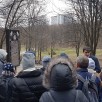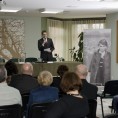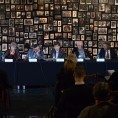Volunteers of the Memorial honoured with the awards “If Not for Those Ten... ”
Seminar in collaboration with the academic centre for oral history in Voronezh
International Summer Academy 2019 in English and German - Call for Participants
Educational challenges in authentic memorial sites
Archive
“Auschwitz and the Holocaust — Dilemmas and Challenges of the Polish Education”
Between 21 and 24 of October 2008, a Polish scientific and didactic conference took place. It was entitled “Auschwitz and the Holocaust — Dilemmas and Challenges of the Polish Education”.
Its main purpose was to summarize the Polish scientific and didactic accomplishments in this area until the time when in 1999 the issue of the Holocaust was introduced to school curricula as a mandatory element of teaching.
Among the most important subjects of the conference there were: significance of education about Auschwitz and the Holocaust in the 21st century, Auschwitz and the Holocaust in the awareness of young people, role of museums and memorials in out-of-school education and Auschwitz and the Holocaust in school and academic education.
The conference was attended by school teachers and academics from the entire Poland dealing, on every-day basis, with teaching of the Holocaust history. The co-organizer was the Centre for Holocaust Studies of the Jagiellonian University.
“Auschwitz and the Holocaust — education in school and at the Memorial Site”
The subject of Auschwitz and the Holocaust in school and out of school in the face of changes in the core curriculum was the main theme of the ;“Auschwitz and the Holocaust — education in school and at the Memorial Site,” which was held on the 12-14 April in Oświęcim. It was attended by 80 school teachers and academics from Poland.
It was organised by the International Centre for Education about Auschwitz and the Holocaust and the Pedagogical University in Kraków.
More information about the conference — LINK
“Auschwitz and the Holocaust in the Context of Genocide in the 20th Century”
Between June 28 and July 1, 2011, the Centre for Education, together with the International Youth Meeting Centre in Oświęcim, the Institute of European Studies of the Jagiellonian University, the Institute of History of the Pedagogical University of Cracow and the Oświęcim Academy, organized a scientific conference entitled the “Auschwitz and the Holocaust in the Context of Genocide in the 20th Century.”
The purpose of the conference was to start a discussion on the nature, course and effects of genocide in the modern world, as well as to reflect on the ways of an efficient education for the prevention of similar crimes in the future. It was addressed to people involved in a historical education in schools, universities and the institutions examining genocide, as well as, popularising the knowledge about Auschwitz and the Holocaust. The conference was attended by 70 people.
“Education About WWII and the Holocaust: New Contexts and Challenges”
The Centre for Education, together with the Warsaw Centre for Socio-Educational Innovation and Training organized, between September 3 and 5, 2010, a methodological conference for teachers.
Methodological conferences take place cyclically since 2007 in the first weekend of September and they are attended by teachers from all over Poland.
The programme of the conference encompasses the issues devoted to the use of documentary films and feature films in school education, as well as lectures devoted to the 71st anniversary of WWII outbreak. The conference was attended by forty-six teachers.
“Faces of Genocide. Nazi Camps on the Polish Soil”
On June 28, 2010, a scientific conference was organized for employees of memorial sites entitled “Faces of Genocide. Nazi Camps on the Polish Soil.”
Its purpose was the exchange of ideas on organizational and functional variety of the Nazi camps and presentation, by the participants, of results of studies regarding this issue. The conference was attended by academics employed in memorial sites: the Majdanek Museum, the Stutthof Museum, the Gross-Rosen Museum, the Martyrdom Museum in Żabików, the Central Museum of Prisoners of War in Łambinowice – Opole, and the State Museum Auschwitz-Birkenau.
“Faces of Justice”
Between June 27 and 30, 2010 in the International Centre for Education about Auschwitz and the Holocaust and the International Youth Meeting Centre, a conference entitled the “Faces of Justice. The World to the Holocaust and Other Crimes of Genocide in the 20th Century” took place.
The conference was divided into several thematic sessions, during which the participants discussed the genocide issue, got to know the histories of war criminals and their post-war fates, as well as listened to the lectures devoted to other genocide crimes, such as the genocide in Rwanda or in the Equatorial Guinea, pseudo-medical experiments or post-war fates of the youngest Auschwitz prisoners. At the end of the conference there was the summarizing discussion panel of the participants and invited guests.
The purpose of the conference was a discussion on the essence and the effects of genocide in the contemporary world, as well as the reflection on the manners of judging them and effective education preventing such crimes in the future.
The conference was attended by almost eighty people dealing with historical education in schools, universities, non-governmental organizations and institutions examining genocide.
The organizers of the meeting, apart from the MCEAH, were the Foundation for the International Youth Meeting Centre in Oświęcim and the Oświęcim Academy in cooperation with the Institute of History of the Pedagogical University of Cracow and the Centre for Holocaust Studies of the Jagiellonian University.
More about the conference — LINK
“Memory, Awareness, Education”
A conference of the Ministers of Education organized by the Polish Ministry of National Education and the MCEAH. The Ministers met in Auschwitz at the 65th anniversary of liberation of the camp.
In the Centre of Dialogue and Prayer over thirty guests debated, including Katarzyna Hall, Polish Minister of Education, Andrei Fursenko the Minister of Education and Science of the Russian Federation and the Israeli Minister of Education, Gideon Sa’ar.
The meeting of the Ministers of Education was an encouragement to discuss subjects related to the history of Auschwitz and the Holocaust. This issue mainly depends on the political will. What is more, Ministries of Education very frequently support institutions which deal with popularization of knowledge about the history of the Holocaust. The conference was ended with a message from the Memorial Site which was read out during the main ceremonies in the former camp Auschwitz-II-Birkenau.
“Memory — Awareness — Responsibility”
Between July 2 and 4, 2007, on the 60th anniversary of the establishment of the State Museum Auschwitz-Birkenau, a three-day international conference was held.
It was attended by over one hundred invited guests: former prisoners of KL Auschwitz (Noach Flug, Halina Birenbaum, Kitty Hart-Moxon, Kazimierz Smoleń, Aharon Weiss and Professor Wacław Długoborski), scientists, historians and representatives of institutions related to the Holocaust (Marek Kucia, Thomas Lutz, Romani Rose, Sara J. Bloomfield, Jonathan Webber, Priest Manfred Deselaers and Israel Gutman). The recapitulating lecture was given by Professor Władysław Bartoszewski.
The Centre for Education released a post-conference publication “Memory – Awareness – Responsibility” containing all speeches of guests and recordings of discussion panels.
”Remembrance has not matured in us yet...”
How do we teach about Auschwitz and the Holocaust in a time we are losing the last eyewitnesses to the history? Are we dealing exclusively with the transfer of historical information or should educators also look for references to problems and challenges of the contemporary world? Of what relevance today, are spoken and material evidence? These are just some of the questions posed during the international education conference "Remembrance has not matured in us yet...” which was held at the Auschwitz Memorial on 26-29 October 2015.
More information about the conference — LINK
“Teachers on Both Sides of Barbed Wire”
To commemorate the Polish Teachers’ Day of Memory and Peace, on April 27, 2010 a conference organized in cooperation with the Association of Polish Teachers took place.
Its title was “Teachers on Both Sides of Barbed Wire.” It was attended by almost 100 teachers from the entire Poland. Pedagogues listened to a lecture about Polish intelligentsia in Auschwitz and became acquainted with the history of teachers-prisoners in Auschwitz and teachers who helped the camp prisoners. On the next day, the March of Silence took place in the former camp which started from the main gate and ended at the Death Wall, where flowers were placed and candles lit.
„The European Association of Holocaust Studies Founding Conference”
Between June 12 and 15, 2011 in Oświęcim and Cracow, a conference inaugurating the operation of the European Centre for Holocaust Studies was held.
The task of the European Centre for Holocaust Studies is not only an integration of the academic environment and educators working at the Holocaust memorial sites, but also standardization of the quality of teaching and initiation of cooperation and international exchange.
The establishment of the European Association of Holocaust Studies is an important step towards the further professionalization of the scientific research on the Holocaust in Europe. The fact that the initiative is implemented in Poland is of particular importance — this is a country particularly marked by the tragic experience of the Holocaust.
The president of the European Association of Holocaust Studies — the EAHS is Prof. Zdzisław Mach, director of the Institute of European Studies of the Jagiellonian University. The organizers of the conference were: the Institute of Sociology of the Jagiellonian University and the State Museum Auschwitz-Birkenau. The conference was a result of a cooperation among experts and the Holocaust researchers from Poland, Great Britain, Sweden and Germany.
“Use of Audiovisual Materials in Education about the Holocaust”
Between September 4 and 6, 2009, a methodological conference for teachers entitled “Use of Audiovisual Materials in Education about the Holocaust” was organized.
Its subject encompassed issues regarding the use of documentary films and feature films in school education. The participants took part in workshops devoted to a comparative analysis of films and classes regarding practical use of audiovisual resources in education. The conference was attended by fifty eight people in total.
“Words in the service of hatred”
More than 120 educators, teachers, representatives of non-governmental organisations dealing with human rights and journalists took part in the fourth edition of the National Conference of "Words in the service of hatred" Auschwitz and the Holocaust against the background of crimes of genocide in the twentieth century, which was held 13-15 June 2013 at the International Youth Meeting Centre and the Auschwitz Memorial Site.
The aim of the conference was to discuss the essence and effects of totalitarian regimes and the crime of genocide in the contemporary world and to reflect upon methods of effective actions to prevent similar crimes in the future.
More information about the conference — LINK
















